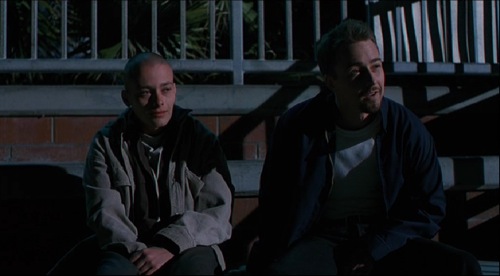To describe Tony Kaye’s American History X in one word is no easy task, but one that applies is brave. In a year when comedies from The Big Lebowski to There’s Something About Mary reigned supreme, a film centred on neo-Nazism could very easily have tanked and been considered wholly inappropriate, yet it didn’t, because American History X takes this concept and makes it personal.
Edward Norton – on scintillating form – plays Derek Vinyard, a reformed neo-Nazi skinhead, trying to guide his younger brother Danny (Edward Furlong) away from the hatred that consumed himself before a stint in prison. It’s a simple enough concept that could’ve been handled in many ways, but the flashback-based, anecdotal structure of the film allows for plenty of character development without too much plot progression too quickly.

As you may expect, this film is exactly as controversial as it sounds: this film contains some of cinema’s most shocking scenes, and David McKenna’s stirring screenplay creates some truly abhorrent, detestable, yet piteous characters. You’ll witness gruesome attacks and some of the most hateful terms in the English language, but a sense of pathos pervades our leads – they seem like rabbits in headlights, trapped in a world that forces them to hate or die, and against all odds, you’ll genuinely feel for them at points.
To call American History X charming may be the wrong term, but there’s an allure to the film on an aesthetic level: Kaye’s cinematography is stunning, with dreamlike, floaty camerawork adding to the film’s hazy atmosphere, but the decision to set flashback sequences in monochrome is a stroke of genius: the primitive colour palette in these scenes mirrors the backwards ideologies and events expressed in them, and encapsulates the film’s grittiness wonderfully.
Performances are generally solid, but it’s Norton’s turn as Derek that really steals the show: his dedication to the role is remarkable, moulding a truly detestable, repulsive lead, but also hinting at a layer of pathos underneath him: it’s a splendidly layered and nuanced performance that shows just how incredible an actor Norton is. Edward Furlong’s performance as Derek’s brother Danny is pleasantly surprising too: despite the dangerous path his character traverses down, there’s an element of charm to him, with the cheeky wit of a teenage boy wrestling with the hateful trail he’s trapped on. Although he can’t eclipse Norton, his performance certainly holds up to him, and there’s palpable chemistry between the brothers.

The plot of American History X is undoubtedly something that needs to be experienced first-hand, without any prior knowledge, but that doesn’t necessarily render it perfect. Yes, there are soaring highs in the story – you’ll be taken on an emotional rollercoaster – but several lows. The plot is somewhat messy: threads crop up at the start and are neglected until the end, and a lot of key information or events are mentioned in passing. Some important characters are discussed but never clearly established, and especially towards the end, events are seemingly glossed over messily to make way for more important material.
The film’s tone occasionally suffers from similar problems: at times American History X feels like a coming-of-age film, especially as we follow Danny in high school, but when the harder, more contentious elements crop up it couldn’t feel further from this. The film gets exceptionally dark at points, which is fine when isolated, but the tone feels messy when this is compared to the more light-hearted material.

That said, by no means do the film’s problems outweigh what it does so right. American History X is spectacularly made and shocking to the core, with two sublime leads, a thoughtful screenplay and stunning direction. The easy route for this film would’ve been to portray the racist characters as monsters – and it does to an extent – but a layer of humanity pervades almost all of the characters. Never before has a film made the viewer reflect so much on what should be a straight-forward question – whether these people are monsters or not – and that’s what makes it so groundbreaking.
★★★★½

